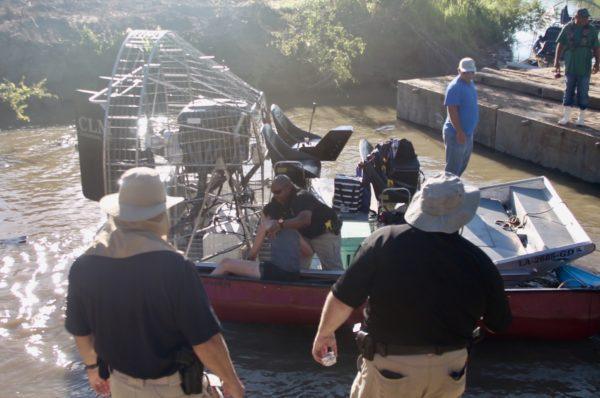Louisiana Law Enforcement Officers Are Moonlighting For A Controversial Pipeline Company
Off-duty law enforcement officers are using state resources to work side jobs for the pipeline company.

Karen Savage is an investigative journalist currently embedded with the L’eau Est La Vie resistance camp in Louisiana. She was arrested in the course of reporting this article.
Pipeline protester Cindy Spoon was trying to stop Energy Transfer Partners’ heavy tree-cutting equipment from coming onto a pristine cypress forest-covered island in Louisiana’s Atchafalaya Basin. As she paddled in the bayou on Aug. 9, fan boats roared around her, blowing her canoe backward and kettling her in a smaller bayou.
Within minutes, Spoon and fellow activist Sophia Cook-Phillips were handcuffed and yanked out of the canoe by armed officers who refused to fully identify themselves.
“What law enforcement agency are you with and where are you taking me?” Spoon asked repeatedly, her voice cracking and growing increasingly frantic as she was pulled up a steep embankment and dragged onto Energy Transfer Partners’ Bayou Bridge pipeline easement.
Spoon and Cook-Phillips later learned they were being detained and dragged onto the construction site by probation and parole officers for the state of Louisiana who were working side jobs for an Energy Transfer Partners contractor.
Spoon, who prefers to be called a water protector, said she knew she was allowed to be on navigable waters, which are generally open to fishermen and members of the public who recreate in the basin. She also knew that setting foot on land where the pipeline was being constructed could result in a felony.
“Despite being informed by law enforcement that the waterways are public and free to use, Louisiana probation and parole officers—acting as ETP’s private security—were allowed to…rip us out from our canoe while in the middle of the public waterway and turn us over to the police to be arrested without question,” said Spoon, adding that local police didn’t even pretend to act like they are in charge.
Sometimes it’s hard to tell who’s who.

A recent increase in resistance to the pipeline project by Spoon and others has revealed a cozy relationship between Energy Transfer Partners and state and local law enforcement officers who work side jobs for security firms contracted by the pipeline company. At the same time, stakes for those opposing the project have never been higher. A new Louisiana law significantly increases the legal consequences for protesters, allowing for felony charges to be filed against those who engage in certain types of nonviolent direct action. Activists and some legal experts are questioning whether officers who are on the payroll of private security firms contracted by Energy Transfer Partners are able to adequately protect the constitutional rights of individuals who oppose the project.
Sometimes officers use state-owned vehicles and other equipment while working these private security jobs.
Anne White Hat, co-founder of the resistance group L’eau Est La Vie, said interactions between probation and parole officers and St. Martin Parish sheriff’s deputies demonstrate the murky relationship between both local and state officials and Energy Transfer Partners, a private corporation. Probation and parole officers appear to be directing the deputies, she added.
Changing the rules
On at least three occasions—one in April experienced by this reporter and two reported by pipeline opponents—probation and parole officers have used state-owned vehicles to make motor vehicle stops while working for the pipeline company.
In all three instances, drivers say they pulled over because the officers wore either shirts or hats that said “police” and appeared to be with a local law enforcement agency.
According to state guidelines provided to The Appeal by the department in late July, probation and parole officers need permission from their district administrator to work second jobs.
The guidelines provided in July also stipulated that state-owned equipment cannot be used while working second jobs unless that work is “under the auspices/authority of an outside law enforcement agency,” which is defined as an “agency with the authority to make arrests and includes city police, sheriff’s office, campus police, state police or federal law enforcement agencies.”
But probation and parole officers are allowed to use department-issued equipment and state-owned vehicles while working secondary assignments, Ken Pastorick, communications director for the Department of Public Safety and Corrections, said in an email on Aug. 15.
When asked in a phone interview a few days later about the discrepancy between the state guidelines The Appeal was given in July and actual practices, Pastorick said the guidelines had been revised and said he would send the current version, which he did a few hours later.
During the interview, Pastorick said the Department of Corrections has been working on the new policy for about a year and a half.
“The old guidelines spelled out that they could not use it [equipment] without the permission of the director, so now you still have to get the permission of the director, but it spells out in there that while on these details, you can use your service weapon, you can use your unit, you can use your uniform—the old policy wasn’t like that,” he said.
Pastorick said officers must obtain permission from the department to work secondary jobs, and once they receive permission, officers are allowed to use their service weapon, their uniform and their vehicle.
“Now, with that said, while they’re working, they’re not in the capacity of a probation and parole officer, but they are in the capacity of a state peace officer—a certified, credentialed state peace officer,” said Pastorick.
“So, they have the same arrest powers and police powers as somebody who might be working for the Louisiana State Police or probation and parole during their regular detail or a city police officer or sheriff’s deputy. But while they’re working those extra duty details, they’re not working for the department, they’re working independently, using their commission to work for companies like Hub or Athos to provide security for that pipeline,” he said, adding that officers are low-paid and often supplement their income with second jobs.
“You know when you look at my officer and with that Louisiana state map on his or her left chest and you see that badge, you know that’s an official law enforcement agent,” said Pastorick, who reiterated that while working outside jobs, the officers are using their commission to work independently.
Guidelines later received by The Appeal from Pastorick were dated Aug. 17—the day of the phone interview. A note in the revised guidelines says “08/17/2018; Supersedes policy PER 218 dated 03/06/2015.” Metadata shows the document was created about an hour after the phone interview.
The revised guidelines now allow for the use of state-issued equipment and state-owned vehicles in the performance of agency-approved jobs.
Pastorick did not respond to multiple requests for further comment.

Spoon and Cook-Phillips, along with Eric Moll, who was also arrested that day, are the first in Louisiana to be charged under a new state law that increases the stakes for protesters by redefining pipelines as critical infrastructure and imposing felony charges on those convicted of entering pipeline construction sites without authorization.
The new law went into effect Aug. 1. Spoon, Cook-Phillips, and Moll, who were arrested on Aug. 9, were each freed on a $10,000 bond. If convicted, each could face a sentence of imprisonment with or without hard labor for up to five years and fines up to $1,000.
Bill Quigley, a New Orleans law professor who is representing the three pro bono, said similar nonviolent protests previously would have been considered misdemeanors.
“In fact, dozens of protesters have been arrested for the same or similar conduct for the past few months—every single one was charged with a misdemeanor. Many did not even have to put up bond,” said Quigley, referring to activists who engaged in nonviolent protests against the Bayou Bridge pipeline before August.
“Now, all of a sudden, the exact same actions are serious felonies with $10,000 bonds? This is precisely the hypercriminalization of protest that critics of the new law predicted,” he said, adding that in both instances activists report they were on either public property or on private property with the permission of the owners.
“Yet the powerful pipeline corporations have orchestrated the state legislature to enact new laws [and] hired state law enforcement to enforce the new laws,” said Quigley.
Bills criminalizing many forms of pipeline protests have been proposed in several states, including Wyoming, Iowa, Minnesota, Pennsylvania, and Ohio. Most are modeled under the conservative American Legislative Exchange Council’s Critical Infrastructure Protection Act, which defines pipelines as “critical infrastructure” and imposes harsh sentences and heavy fines to those convicted of entering a facility without the express permission of the landowner.
Quigley said it’s unclear how the new law would apply on public trust land. While the definition of which waterways are navigable and what rights landowners have has been subject to debate, he said in this case the activists were on public trust waters and should not have been arrested. If the district attorney presses charges, he said, they will challenge the new law in court as part of their defense.
Pipeline police
Photos from the day of Spoon’s arrest show that armed security officers for the Bayou Bridge project wore badges and uniforms identifying them as probation and parole officers. Some also wore dark blue hats and shirts with “POLICE” in large white letters.
When Spoon and this reporter asked which law enforcement agency they work for, a few said they work “for the state.” One officer said to call the Department of Corrections in Baton Rouge for more information on the arrests. Most refused to answer.
Deputies with the St. Martin Parish Sheriff’s Office, the local law enforcement agency, arrived about 30 minutes after the incident took place. They arrested and charged the protesters under the new felony law based on information given to them by probation and parole officers, who had removed Spoon, Cook-Phillips, and Moll from the waterway and onto the land portion of the easement at the direction of pipeline supervisors.
A more recent incident took place on cypress tree-covered land in the Atchafalaya Basin that is jointly owned by hundreds of individuals. In a petition filed against several hundred property co-owners in July, Energy Transfer Partners said it has easement agreements with nearly additional 350 co-owners, but is seeking a judgement of expropriation against the remaining co-owners.
To prevent further construction, several landowners who oppose the project have given activists permission to occupy the land. Generally, guests on private property need only the permission of one owner in order to be legally present.
Despite having permission to be on the land, five pipeline opponents and this reporter were arrested last weekend by St. Martin Parish sheriff’s deputies. All but one were charged with felonies under the new law.
The company must have easement agreements with or expropriation judgments against all landowners in order to legally proceed with construction, Robert Verchick, professor of environmental law at Loyola University New Orleans, told Inside Climate News. The company has cut cypress trees, dug a trench and is in the process of moving pipeline through the property.
Deputies are allowing the company to continue to work.
“The fact that this company is allowed to do whatever it wants while the rights of our water protectors are being trampled, while landowners’ rights are being trampled, really makes me question who the St. Martin Parish deputies are working for,” said Cherri Foytlin, co-founder of the L’eau Est La Vie resistance camp.
“In North Dakota, they paid TigerSwan mercenaries to terrorize water protectors,” said Foytlin. She expressed similar worries about what could happen in Louisiana given the relationship between ETP and local law enforcement, adding that one activist was tased and another threatened with a semi-automatic weapon.
St. Martin Parish sheriff’s deputies told those arrested that they have signed affidavits from some of the landowners and told activists they are not allowed on the property. When asked, deputies would not say which landowners had signed the affidavits, nor could they provide copies of the documents.
The St. Martin Parish Sheriff’s Office did not respond to multiple requests for comment.
The resistance grows
Construction of the Bayou Bridge pipeline was controversial before it began. It is part of a larger project intended to connect Energy Transfer Partners’ Dakota Access pipeline in North Dakota to refineries in St. James Parish and nearby export terminals.
Normally sparsely attended, public permitting hearings overflowed and contentious debates broke out between industry speakers and pipeline opponents.
Founded by four Native women, L’eau Est La Vie launched last year and activists began nonviolent direct actions against the project nearly as soon as construction began in January.
It is believed to be the first-ever large-scale resistance to the fossil fuel industry in the previously oil-friendly state.
In recent months, activists have ramped up the resistance, engaging in tree sits and other nonviolent direct actions in the Atchafalaya Basin, all aimed at protecting the swamp’s delicate ecosystem. They also hope to spur public officials to require the company to provide an evacuation route for St. James.
Because of the resistance, Energy Transfer Partners maintains a hefty security force.
The company has relied on at least three firms—Hub Enterprises, Athos Group, and Hillard Heintze—to monitor the 163-mile route and to keep tabs on those who oppose the project.
To fulfill that mission, Athos and Hub hired probation and parole officers, employees of the state of Louisiana under the Department of Public Safety and Corrections, to fill those jobs.
Between September 2016 and July 2018, nearly 60 officers assigned to the Louisiana Division of Probation and Parole were approved to work secondary jobs providing pipeline security through one or both of the companies.
Since The Appeal began its investigation, probation and parole officers have stopped working for the Bayou Bridge project.
“Our officers are out of that detail now and I believe that you can talk to Hub and I’ve heard that Hub has maybe some St. Martin Parish deputies working that detail now,” Pastorick said.
Citing a confidentiality agreement with Energy Transfer Partners, Hub Enterprises declined to comment.
An Energy Transfer Partners spokesperson said the company is thankful for local and state law enforcement, but declined to comment on their security firms or on the arrests.
A representative for the St. Martin Parish Sheriff’s Office did not respond to multiple requests for comment.
It is unknown how many, if any, deputies from the department work secondary jobs for Bayou Bridge.
Quigley, the activists’ attorney, said he finds it very troubling that a big corporation can come into the state and hire state and local law enforcement employees as their private security guards.
“Once hired, the corporation has the private benefit of public employees showing up in state law enforcement uniforms with state-issued weapons and state-issued gear to impose the power of the state on behalf of the highest bidder,” he said.
“What shows the raw power of big money more than bringing in the big guns of state law enforcement? This is an absolute abuse of public trust,” Quigley added.
White Hat said, “They are targeting strong women, who are inherently protectors of the water and they’re coming straight at us in a very cowardly way.” She added that “ultimately what’s at stake is clean water for our kids—for more than 300,000 people, for the city of New Orleans and for South Louisiana.”
“We’re not going to let people bully us around like that,” White Hat said. “They will be held accountable.”
